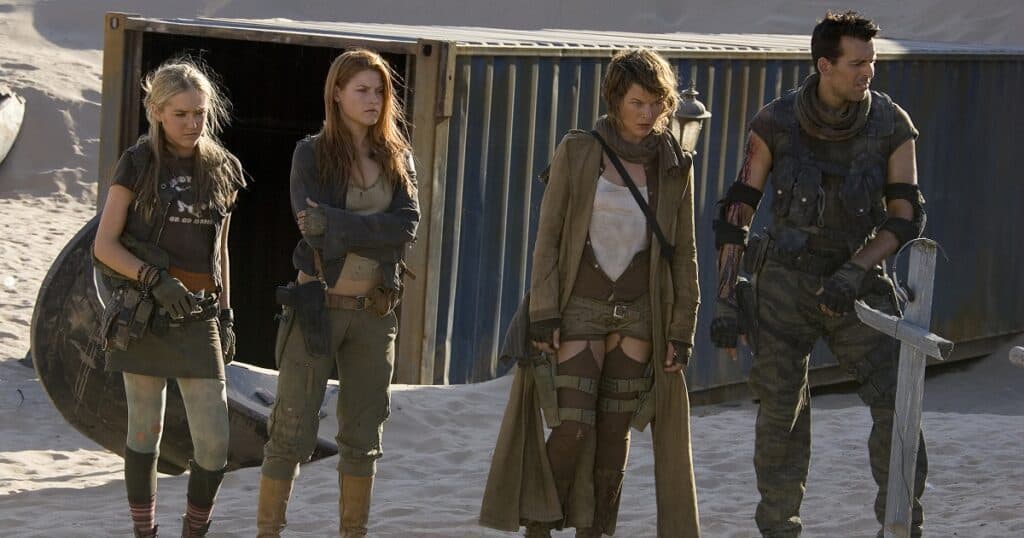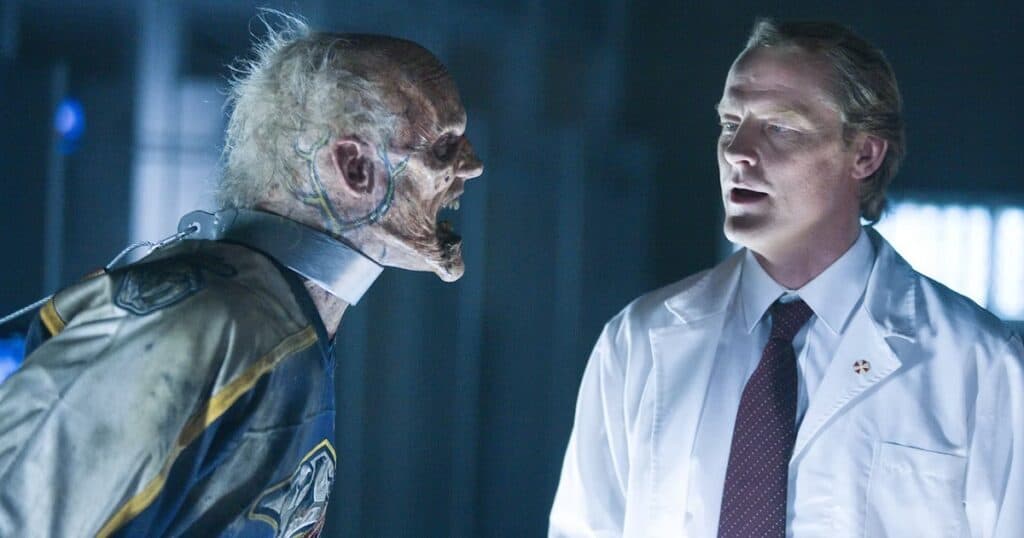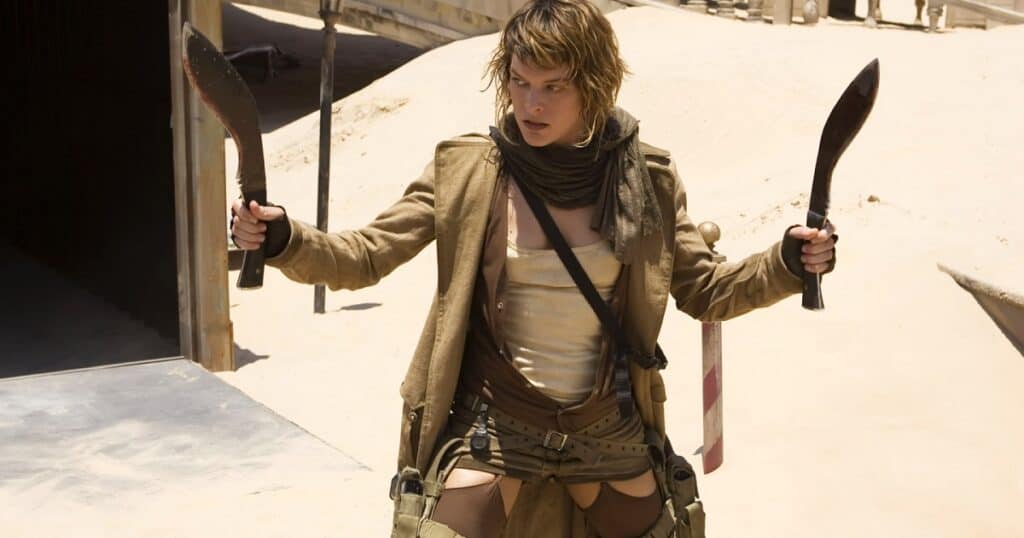
What’s the saying? Oh yeah… third times the charm and the Resident Evil series is no exception. For our third outing we’re here to explore the aftermath of the apocalypse with Resident Evil: Extinction (watch it HERE). This one is pretty divisive with the consensus being some people, like myself, loved this film while others felt this was the beginning of the downward slope of sequels of the franchise. Hear me out as to why I sing its praises. For one, it tells a cohesive story and gives us a side of Alice that we’ve been dying to see. We get more new characters that bring gravitas to the story as well as a fully fleshed out villain and it’s a lot of fun. Plus, its pays homage to The Road Warrior in the best way. So, let’s hit up the Sand Dunes of Vegas, stock up on firepower and beware of infected crows as we dive into Resident Evil: Extinction.
Back in 2004, Resident Evil: Apocalypse was released in theaters. While it was very successful financially, and grossed over $23 million in its opening weekend, both audiences and critics felt it left a bad taste in their mouths. Paul W.S. Anderson, the previous director of the first film and producer of Apocalypse, didn’t like the style that director Alexander Witt took in the sequel. Anderson told SciFi Wire that he would like to oversee a third installment. On June 13, 2005, Sony and Screen Gems announced that a third film and a planned sequel were in the works. The working title was Resident Evil: Afterlife. As we all know, that title would be given to the fourth film in the series. The title would be changed to Resident Evil: Extinction. Anderson didn’t want to direct the third outing, for some reason, so the hunt was on for the next director of the series… but who would it be?
Lo and behold, Anderson would look to Russell Mulcahy for directing duties. He was very impressed with his work on Highlander, Highlander II: The Quickening, The Shadow and Ricochet. After Russell signed on to direct, Anderson said, “Russell pioneered a very distinct visual style, a lot of moving camera and crane work, lots of very fast cutting. He’s got a very cool eye and sees great ways to shoot. His work certainly had a big influence on me as a filmmaker and that’s why I was very excited to work with him on this movie.”
Paul W.S. Anderson would come back to write the script. He changed up the scenery from a desolate city and instead gave us a desolate wasteland. It draws inspiration from Westerns and the Mad Max series, with plot elements that included oil and supplies shortages, convoys in the desert as well as the desert taking over most locations. While it borrows themes from other films, Anderson would go on to say the story is original. “It’s all part of trying to deliver a movie-going experience that satisfies the fans of the game but also provides a fun cinematic experience for a broader audience that has never played a Resident Evil game.” Both of the previous films would be loosely based on or around some of the video games in the series. Extinction would branch completely away from them. Even though it’s a film that stands on its own and feels significantly different, it would include a replica Hive Facility and Spencer Mansion, like in the first film. It would also introduce us to a new holographic computer database known as the White Queen. Other new characters, both living and undead, would also make appearances including the introduction of both Claire Redfield and Albert Wesker, who are from the video game series, as well as the “Super Undead”. These are a result of Umbrella experimenting with the Undead, attempting to give them some intelligence and humanity. The experiments didn’t quite work out and the side effect results in the Super Undead.

At the time of casting, Milla Jovovich wasn’t interested in doing a third film due to her disappointment with Apocalypse. After she read the script however, she changed her mind… I wonder if Anderson had a hand in that? Mike Epps confirmed that he would be coming back as L.J. Wade as well as Oded Fehr for Carlos Oliveria. Iain Glen would also reprise his role of Dr. Alexander Issacs, but, there would be a major character not returning for this film, and that was Jill Valentine. Sienna Guillory was planned to reprise the role but passed for prior commitments to Eragon. Listen, to each their own, but Jill not being in this film felt like something was missing. I’m sure Sienna had her reasons why she thought Eragon was the better option, but as we all know, that film was a huge disappointment at the box office and the interest for further films lay dead in the water. Ali Larter would tackle the role of Claire Redfiled. In the game, Claire is in a never-ending search for her brother Chris. Instead in the film, she leads a convoy of survivors across the desert. Other newcomers to the film included Ashanti as well as Spencer Locke and Jason O’Mara. Fun fact about Jason, is that this is the only film where he portrays Albert Wesker. All of the sequels after this, Wesker would be played by Shawn Roberts.
The plot of Resident Evil Extinction takes place five years after the events of Apocalypse. The world remains ravaged by the T-virus outbreak, leaving Alice to wander the desolate desert alone. She eventually encounters a group of survivors led by Claire Redfield, and together they embark on a journey to find a rumored safe haven in Alaska. Along the way, they face relentless attacks from both the undead and Umbrella Corporation’s forces, as well as genetically modified Super Undead zombies. Alice discovers her enhanced psychic abilities, a result of Umbrella’s experiments, which aid her in battling the corporation’s plans. Their quest leads to a final showdown with Umbrella’s head, Dr. Isaacs, and the revelation of sinister trickery driving the apocalypse, setting the stage for a continued struggle against the forces of evil.
Principal Photography began in May 2006 in Mexicali and Baja California, Mexico. Filming locations were changed from the Australian Outback to Mexico. This would cause the production dates to be pushed back repeatedly. Russell Mulcahy insisted that the film be shot during the day in the blazing sun instead of at night. David Johnson was hired as the film’s Director of Photography. Seeing as how Paul W.S. Anderson had hired David for the first Resident Evil and Alien vs. Predator, it was a no brainer to bring him back. It was a breath of fresh air to be able to see the action this time around. Production Designer Eugenio Caballero would design multiple sets including Umbrella’s underground lab, The Vegas Strip covered in sand as well as the New York-New York Hotel & Casino, Paris Las Vegas, Rialto Ponte, Luxor Hotel and the Spencer Mansion replica. Tons of small scale models were built against blue screens to create the desolate Vegas Strip. Temperatures reached up to 130 degrees in various Mexico locations and various members of the crew would have to be treated for hydration.
The film began its post production process in July 2006. Details had to be kept secret. Tatopoulos Studios and Mr. X. Inc, who worked on Silent Hill, were hired to do the film’s special effects. Mumbai-based Anibrain was also hired to work on visual effects for the film too. Around 2006, VFX companies started to use NVIDIA Technology. A perfect example of this, at the time, ground breaking technology, is when we see a “fly-through” of the interior of a satellite displaying photorealistic animation. It looks very impressive and was just the start of what that technology would be capable of.
To get buzz started for the film, its first teaser trailer, which is reminiscent of the “Regenerate” teaser, was shown in front of Ghost Rider in February of 2007. Sony’s website for the film would launch on February 17 of that same year. There it would state the film’s official release date of September 21, 2007.

The composers for the first film were Marilyn Manson and Marco Beltram. For Apocalypse, Jeff Dana composed the score. But this time around, we were treated to Charlie Clouser as composer. If you don’t know who that his, give yourself a refresher and listen to the Saw Theme Song. Yep, that’s him. Charlie Clouser probably had the best year in 2007. Not only did he compose Resident Evil: Extinction, but he also orchestrated the scores for Dead Silence, Death Sentence and Saw IV. I don’t know about you, but Dead Silence’s score is one of my all time favorites in regards to horror films. I guess you can say us Resident Evil fans were in good hands.
Resident Evil: Extinction opened on September 21, 2007. It opened to first place on opening weekend grossing a healthy $23 million, beating out newcomers Good Luck Chuck and Sydney White. Domestically it would gross around $50 million as well as rake in another $97 million internationally, ending with a worldwide total of $147 million on a budget consisting of $45 million.
As stated in our last video, critics despised Resident Evil: Apocalypse. Because of that, critics were not able to screen the film before the general audience. Sony was clearly afraid of what critics would say about the film. Unfortunately, they still weren’t kind to this film. Currently, this film holds a 25% on Rotten Tomatoes with the consensus reading, “Resident Evil Extinction is more of the same; its few impressive action sequences unable to compensate for the pedestrian plot.” Hmm, what’s this? A positive review by a critic! Kevin Crust of The Los Angeles Times praised the film. He said the story and characters were engaging with fight scenes and scares were effectively placed between plot turns. There was a common complaint noticed by everyone, and that’s the unnecessary digital airbrushing. This is prominent on most of Milla’s face during close ups.
Resident Evil: Extinction was released on DVD, Blu-ray and UMD on January 1, 2008. What a way to ring in the New Year! A Blu-ray release of the Resident Evil Trilogy was also released on that same day. At this time, with state of the art discs releasing for home media, VHS tapes would be discontinued. Nowadays, there is a huge nostalgia and resurgence for VHS and analog media. If anyone at Screen Gems or Sony is watching this, can you please release this on VHS? I’d love to complete the original trilogy for my collection as well as Star Wars Episode III: Revenge Of the Sith! The film came packed with Deleted Scenes, Commentary, Making of featurettes as well as a sneak peek of Resident Evil: Degeneration, the first CGI Resident Evil film. Back when Blu-rays were Brand New and the hottest technology, most distributors would release a special feature called Picture-In-Picture. Basically, you could watch the movie on your Blu-ray Player at home. PiP for short, allows you to view additional content simultaneously with the main video playback. When viewing it, a smaller window would be overlaid on the main video screen and display additional content like interviews with cast, making of documentaries or storyboard comparison, while the main video continues to play.
While critics may have written this film off, there was no denying that everyone loved the action, and oh man does this film bring it. The beginning of the film, where Alice is taken hostage by a family of marauders. There they make her fight to the death against fan favorite zombie dogs. Of course Alice prevails and manages to escape, but this sequence was a breath of fresh air and a wonderful welcome back for our protagonist. Two other huge moments stand out in the film to me as well. The Las Vegas Strip shootout scene is nothing short of relentless action, mayhem and fun. Dr. Isaac unleashes an endless horde of zombies on the convoy of survivors killing most of them, but not without Alice kicking some serious ass as well as Carlos and Claire getting a few rounds in. Last but not least, we can’t forget about the awesome end battle of Alice vs Mutated Dr. Issacs. In so many ways, it felt like the end battle was a capper of the series. Alice has deja vu, as does the audience, as we see her break into the replica Hive and avoid most of the same obstacles we’ve come to know and love from the first film. The fight scene is visually stunning and filled with high-octane action and suspense. It not only serves as the climactic confrontation between Alice and Dr. Issacs, but also highlights the dynamics between one another.

There is a clear divide on this film. There are some who really enjoy it and think it’s one of the best, and there are others who think this is where the train jumped the rails and the series was never the same afterwards. As someone who thoroughly enjoyed this film, I can see why some wouldn’t enjoy this as much. It strays away from what the first two films had going for it… and that’s being video game adaptations. This time around, it felt more like a horror action Mad Max film, but in the best way. Alice is fully fleshed out here and has a story arc that feels engaging. There are no secrets of her past that are going to randomly come out at the last second. We know her motive throughout and it makes for a truly fun time.
However, I can’t ignore some things. The first, and most important, is the omission of Jill Valentine. In our previous video, I believed that she was the best part of the film. Her presence not being here is felt all throughout and definitely feels like a bummer. Second is killing off Carlos and L.J. Carlos was the male protagonist the series needed and he plays off Alice so well here. L.J.’s character gets more of a juicier role this time around and isn’t just the comedian of the group. When he turns into a Zombie and bites Carlos, it’s very disheartening. Carlos, however, goes out with a bang and is one of the highlights, to me, of the whole series. The survivors have to break into Umbrella’s underground facility. Carlos pulls a Dom from Gears of War and sacrifices himself for the group to reach their destination. It’s so good and you can’t help but fist-pump as Carlos says his final farewell.
In conclusion, what makes this such a great addition to the series? For one, it has an engaging storyline. and follows Alice, as she navigates through the desert wasteland. The narrative keeps viewers engaged from start to finish, with twists and turns that maintain suspense and excitement. It boasts Milla Jovovich’s best performance in the series so far, showcasing her resilience, courage, and determination in the face of overwhelming odds. It’s stunning to look at with impressive visual effects that feature desolate desert landscapes, menacing creatures and action-packed sequences. It also has tons of rewatchability. While opinions on Resident Evil: Extinction may vary, its strong storyline, performances, visual effects, and action-packed sequences contribute to its overall appeal and make it a satisfying entry in the franchise for many viewers.
With this being a six film series, its only natural to conclude this episode with saying that, once again, because of the financial success of this film, another one was on the horizon. In 2010, we would get the fourth film in the ongoing franchise aptly named Resident Evil: Afterlife and would be the series first foray into 3D technology. So what do you think? Would you like to see us cover Afterlife? Let us know in the comments below!
Two previous episodes of Revisited can be seen below. To see more of our shows, head over to the JoBlo Horror Originals channel – and subscribe while you’re at it!
The post Resident Evil: Extinction (2007) Revisited – Horror Movie Review appeared first on JoBlo.
Leave a Reply